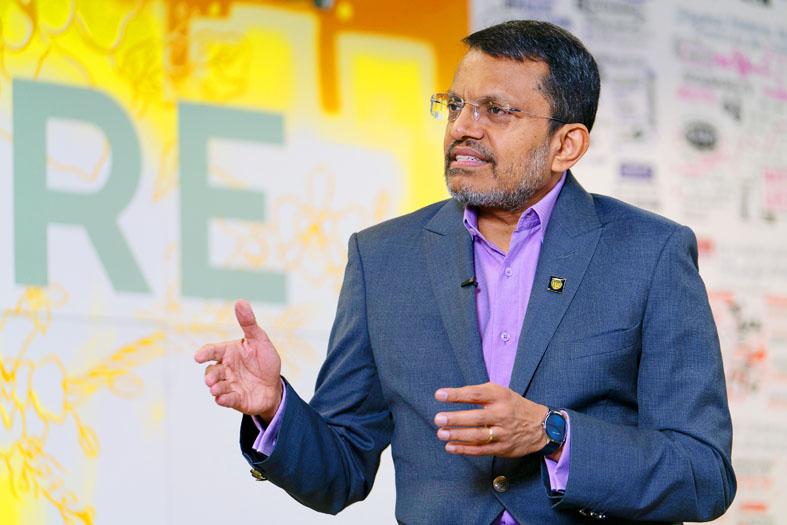Singapore’s financial watchdog is turning to regulation and technology to tackle so-called “greenwashing,” which it considers the weakest link in the push to expand sustainable finance.
Banks in Singapore are to undergo stress tests from next year while making regulatory disclosures to ensure that they are managing risks related to climate change and other environmental issues, Monetary Authority of Singapore (MAS) managing director Ravi Menon said.
Data verification using technology that can attest to the provenance of green products would also be required, he added.

Photo: Bloomberg
Menon said the potential for greenwashing is on the rise as more funds are allocated for sustainability projects. Stocks and funds highly rated on environmental, social and governance metrics have attracted trillions of dollars of investments in recent years.
The introduction of stress tests means banks would have to get a better handle on the climate risks tied to their borrowers, their customers and supply chains, said Menon, who also heads the city-state’s central bank. “That will increasingly become a supervisory expectation,” he said.
Singapore launched a national program that is to use artificial intelligence to help with risk analysis for the financial industry at its annual fintech festival yesterday. Part of the program is a partnership between local lenders and fintech firms to assess companies’ environmental impact and identify emerging environmental risks, as well as check against greenwashing, Singaporean Deputy Prime Minister Heng Swee Keat (王瑞傑) said at the event.
The MAS is joining other central banks in the UK, Europe and Canada in putting their financial institutions through assessments that scrutinize the impact of climate change on everything from real estate to corporate loans.
Starting next year, all listed firms in Singapore, including banks, need to publicize information in line with recommendations from the G20’s task force on climate-related financial disclosures. Mandatory disclosure also extends to ESG fund products sold to retail investors, Menon said.
In line with major global banks, lenders in Singapore have started to reduce their exposure to some of the industries linked to climate change, such as coal. DBS Group Holdings Ltd, Oversea-Chinese Banking Corp and United Overseas Bank Ltd, the three major Singapore banks that are also the largest in Southeast Asia by assets, pledged to stop financing new coal-fired power projects, honoring only previously committed ones.
Many emerging economies in the region such as Vietnam and Indonesia still rely on coal, considered the world’s dirtiest fuel. Palm oil is another major industry in Southeast Asia often linked to deforestation and haze.
Asked whether the MAS would ask local banks to curb their financing for activities related to palm oil, Menon said that the regulator never makes pronouncements on any particular sector.
“These are issues we study closely,” Menon said. “You don’t want to rush to say ‘this activity is brown, and you should not invest in it, or you should not make loans to finance it.’”
People need to be given “greener alternatives” to whatever they are doing that is not so environmentally friendly, Menon said. Banks can offer financing that helps the industry transition to a replacement of palm, if and when there is one, he said.
“So if in five or 10 years’ time, the way in which palm oil cultivation is done is reformed, then the lenders need to pay more attention to it,” he said, adding that they can work with borrowers to improve the way palm oil is harvested to minimize deforestation.

South Korea’s equity benchmark yesterday crossed a new milestone just a month after surpassing the once-unthinkable 5,000 mark as surging global memory demand powers the country’s biggest chipmakers. The KOSPI advanced as much as 2.6 percent to a record 6,123, with Samsung Electronics Co and SK Hynix Inc each gaining more than 2 percent. With the benchmark now up 45 percent this year, South Korea’s stock market capitalization has also moved past France’s, following last month’s overtaking of Germany’s. Long overlooked by foreign funds, despite being undervalued, South Korean stocks have now emerged as clear winners in the global market. The so-called “artificial intelligence

‘SEISMIC SHIFT’: The researcher forecast there would be about 1.1 billion mobile shipments this year, down from 1.26 billion the prior year and erasing years of gains The global smartphone market is expected to contract 12.9 percent this year due to the unprecedented memorychip shortage, marking “a crisis like no other,” researcher International Data Corp (IDC) said. The new forecast, a dramatic revision down from earlier estimates, gives the latest accounting of the ongoing memory crunch that is affecting every corner of the electronics industry. The demand for advanced memory to power artificial intelligence (AI) tasks has drained global supply until well into next year and jeopardizes the business model of many smartphone makers. IDC forecast about 1.1 billion mobile shipments this year, down from 1.26 billion the prior

Chinese artificial intelligence (AI) start-up DeepSeek’s (深度求索) latest AI model, set to be released as soon as next week, was trained on Nvidia Corp’s most advanced AI chip, the Blackwell, a senior official of US President Donald Trump’s administration said on Monday, in what could represent a violation of US export controls. The US believes DeepSeek will remove the technical indicators that might reveal its use of American AI chips, the official said, adding that the Blackwells are likely clustered at its data center in Inner Mongolia, an autonomous region of China. The person declined to say how the US government received

People stand in a Pokemon store in Tokyo on Thursday. One of the world highest-grossing franchises is celebrated its 30th anniversary yesterday.